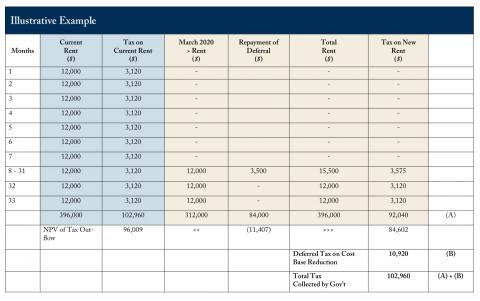From: Michael J. O’Connor
To: Bill Morneau, Minister of Finance
Date: April 16, 2020
Re: A Tax Policy Response for Commercial Landlords and Tenants
Commercial landlords and tenants face uncharted issues as a result of the sudden restrictions on mobility due to the COVID-19 pandemic.
None of the government responses to date, which focus on employees and families, fully recognizes that small- and medium-sized businesses along with non-profits and charities have rent obligations.
On April 11, responding to a question in Parliament on rent relief for small businesses, the Government indicated being open to listening to ideas. I suggest the federal government take leadership by implementing a national framework to guide landlord-tenant rent renegotiation, combined with a tax incentive for commercial landlords to enter into such agreements.
The real estate rental and leasing industry, which includes managing, selling and renting real estate, represented about 12.5 percent of GDP and about 2.9 percent of the growth in 2019. Accordingly, any disruption in the supply of property for rent will lead to considerable economic knock-on effects. Government support to landlords and tenants during the COVID-19 dislocation will be essential to the economic recovery.
Provincial governments have taken swift actions that will protect tenants from eviction for non-payment of rent and are allowing deferral of property taxes in some cases.
None of this protects the landlord. Landlords may be able to restructure loans, but capital deployed in the commercial property space does not come solely from debt. There are other landlord costs that do not go away and depending on the terms of a particular lease may well be borne by landlords. Some are payroll related and will be covered by federal wage subsidy programs, but the core of the activity in the landlord-tenant relationship is still rent. High rents in major centres across the country, spawned by the recent low interest rate environment, aggravate the situation further.
With this context in mind, Canada should establish, at least for the benefit of small- and medium-sized businesses, a national framework for lease reduction and renegotiations, combined with a landlord federal tax incentive to encourage wide-scale adoption.
Such a framework would need the support of federal, provincial and municipal levels of government. The principles of the framework could be modelled after the Australian National Cabinet Mandatory Code of Conduct. The landlord tax incentive would be limited to arm’s length relationships between landlords and tenants, who would jointly agree to a reduction or deferral of rent in 2020 for say, up to seven months (March through September inclusive) and subject to repayment over the remaining term of the lease, up to a maximum of say, 24 months.
As a tax incentive to landlords, only one-half of the amounts deferred would be included in taxable income, and could include a reduction to the undepreciated capital cost or adjusted cost base for the amount of rent deferred. Governments can then recoup the cost of the tax incentive through deferred taxation on lower depreciation over the remaining life of the property or eventual capital gain.
The proposal would be designed to level the playing field between tenants and landlords and create certainty, while avoiding disputes and providing a clear direction and framework for dealing with the issues facing tenants and landlords. In addition, it provides an incentive for landlords to enter into such arrangements. Special rules may need to be developed to integrate the income of flow-through entities.
The table below illustrates how the effect of a seven-month deferral of rent on cash flow and taxes. During the seven-month period, it is assumed that landlords are eligible for the federal wage subsidies and interest deferrals from lenders. In the example below, the landlord eventually obtains a higher rental rate, subsidized by the proposed tax incentive on the deferred rent.
Governments collect higher taxes in the future as a result of the adjusted cost base reduction, entirely financing the tax incentive. The net present value of lower taxes gives the landlord an incentive to enter into the deferral agreement. Obviously, rent reductions could also be encouraged.
Source: Author’s calculations based on a seven-month rent deferral agreement followed by a 24-month repayment schedule, assuming a five percent discount rate and a 26 percent tax rate, and a proposed 50 percent taxable income inclusion rate on the deferred income.
Each of the provinces has taken steps within their own constitutional powers to deal with certain aspects of the landlord-tenant relationship as a result of COVID-19 shutdowns. But these overlook the effects on landlords. A national framework guiding landlord-tenant rent renegotiation, combined with a tax incentive for landlords to enter into such agreements, is badly needed.
Michael J. O'Connor, CPA, CA, is a retired senior tax executive at Sun Life, Alcan, and formerly a partner at a national accounting firm.
To send a comment or leave feedback, email us at blog@cdhowe.org.
The views expressed here are those of the author. The C.D. Howe Institute does not take corporate positions on policy matters.






